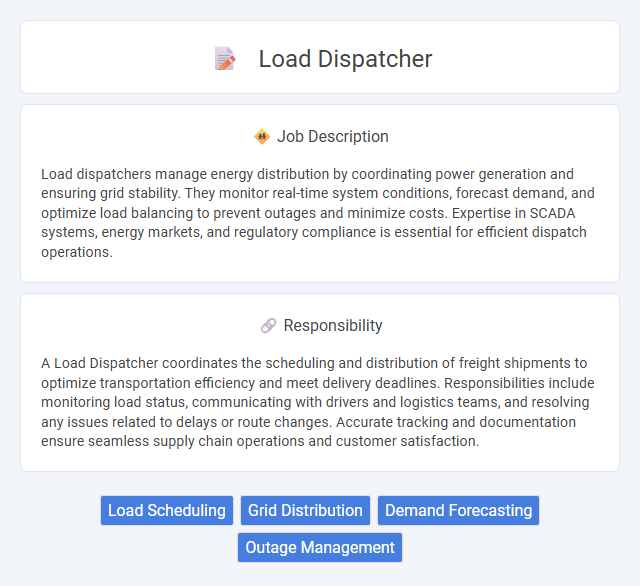
Load dispatchers manage energy distribution by coordinating power generation and ensuring grid stability. They monitor real-time system conditions, forecast demand, and optimize load balancing to prevent outages and minimize costs. Expertise in SCADA systems, energy markets, and regulatory compliance is essential for efficient dispatch operations.
Individuals who thrive in fast-paced, high-pressure environments are more likely to be suitable for a Load Dispatcher role, as it demands quick decision-making and strong organizational skills. Those with excellent communication abilities and attention to detail probably have a higher chance of managing dynamic transportation demands effectively. People who struggle with stress or prefer routine tasks might find this job less fitting due to its unpredictable nature and constant need for real-time problem-solving.
Qualification
A Load Dispatcher must possess strong electrical engineering knowledge, with expertise in power system operations and grid management. Proficiency in SCADA systems, real-time data monitoring, and communication skills are essential for effective coordination and load balancing. A bachelor's degree in electrical engineering or a related field, along with industry certifications such as NERC Reliability Operator Certification, significantly enhances job qualifications.
Responsibility
A Load Dispatcher coordinates the scheduling and distribution of freight shipments to optimize transportation efficiency and meet delivery deadlines. Responsibilities include monitoring load status, communicating with drivers and logistics teams, and resolving any issues related to delays or route changes. Accurate tracking and documentation ensure seamless supply chain operations and customer satisfaction.
Benefit
A career as a Load Dispatcher likely offers significant benefits such as competitive salaries and comprehensive benefits packages, including health insurance and retirement plans. There is a strong probability that job stability is enhanced due to the critical role dispatchers play in managing power grid operations, ensuring continuous energy delivery. Opportunities for advancement and skill development probably exist, supporting long-term career growth in the energy sector.
Challenge
Load Dispatcher roles likely involve managing complex logistics and balancing real-time operational demands, which presents significant challenges. The job probably requires rapid decision-making under pressure to ensure efficient distribution and prevent system overloads. Handling unexpected issues and maintaining communication with multiple teams may further increase the difficulty of this position.
Career Advancement
A Load Dispatcher plays a crucial role in managing electrical grid operations, ensuring the balance of supply and demand for reliable power delivery. Career advancement opportunities in this field often lead to senior dispatch roles, system operations supervisor, or control center manager positions, leveraging expertise in grid management and real-time decision-making. Specialized certifications and experience with energy management systems can significantly enhance prospects for leadership roles within utility companies.
Key Terms
Load Scheduling
Load dispatchers coordinate and schedule freight loads to optimize transportation efficiency and meet delivery deadlines. They analyze freight availability, vehicle capacity, and route constraints using advanced logistics software to plan load assignments accurately. Effective load scheduling reduces operational costs, improves on-time performance, and enhances supply chain reliability.
Grid Distribution
A Load Dispatcher coordinates and controls the efficient distribution of electrical power across the grid to maintain stability and reliability. Utilizing real-time data from SCADA systems, they balance supply and demand by managing generation units and transmission lines while preventing overloads. Their role is critical in minimizing outages and ensuring seamless power flow across interconnected networks.
Demand Forecasting
Load Dispatchers play a critical role in demand forecasting by analyzing real-time data and historical consumption patterns to predict electricity load requirements accurately. They utilize advanced algorithms and forecasting models to ensure optimal balance between power supply and demand, minimizing outages and enhancing grid reliability. Their precise demand forecasting supports efficient energy distribution, reduces operational costs, and maintains system stability within electrical grids.
Outage Management
Load Dispatchers play a critical role in Outage Management by coordinating power system operations to maintain grid stability and reliability. They monitor real-time data to detect outages, prioritize restoration efforts, and dispatch repair crews efficiently to minimize downtime. Effective outage management ensures rapid response, reduces customer impact, and supports overall energy distribution resilience.
 kuljobs.com
kuljobs.com